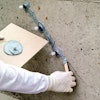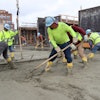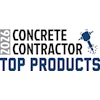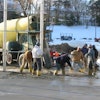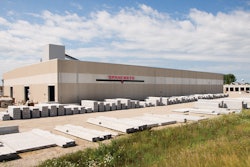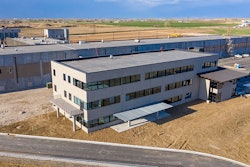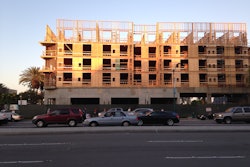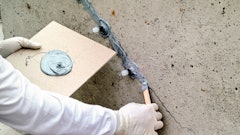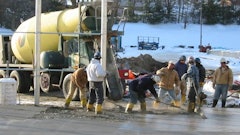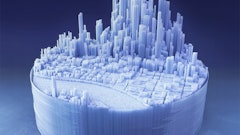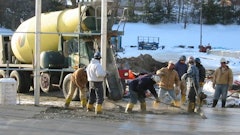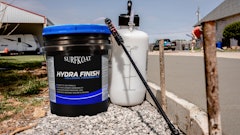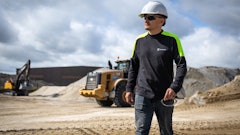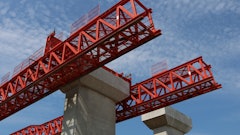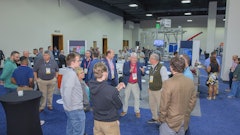With more than 125 years of combined experience in the industry, a partnership between Wells and Spancrete aligns the two companies dedicated to precast innovation. Earlier this year, Wells acquired Spancrete, making them the largest precaster in the Midwest. Jonathan Kozlowski, editor of Concrete Contractor, connected with Wells CEO Dan Juntunen about what this means for the concrete contractor.
Concrete Contractor’s The Cure is a video series dedicated to talk about the concrete industry, happenings, and looks to find a cure to the issues concrete contractors have. Episodes can cover a wide range of topics including placing concrete, pouring cement, decorative concrete, etc. Learn about equipment and products, pumps, trowels, repair, and much more. Hosted by Concrete Contractor editor Jonathan Kozlowski.
In line with the 28-day cure time, new episodes of The Cure are released on the 28th of the month.
Transcription
JK: Jonathan Kozlowski | DJ: Dan Juntunen, CEO, Wells
JK: Hello, everyone. Welcome to another episode of The Cure. This is Jonathan Kozlowski with Concrete Contractor. I'm actually on location at a local grocery store. Let me tell you why. This was the location of Waukesha, Wisc.'s Spancrete. Earlier this year, Spancrete was actually acquired by Wells Concrete [later changing their name to "Wells"], which made them the largest precaster in the Midwest. I contacted CEO Dan Juntunen and asked a few questions. So, stick with us and find out what that actually means for the concrete contractor right after this intro.
DJ: So, Wells has been around—both companies, Wells a little over, I think we'll have our 65th anniversary next year and Spancrete was 75 years and both started as precast concrete manufacturers and installers. Wells has always been for public and commercial structures. So, it started off with industrial food processing, parking, etc., and Spancrete has also done DOT work—so bridge girders in addition to all the same type of structures that Wells Concrete has done over the years. In addition, Spancrete has an equipment line. Spancrete Machinery Company with corporation has made an extruder for hollow core product. And so they install machinery around the world as well as providing precast for structures and rich girders.
JK: This makes Wells Concrete the largest precaster in the Midwest, what does this acquisition mean for the contractor?
DJ: I would say this acquisition means for the contractor is in addition to our—it really dovetails our footprint with a lot of our major clients. And so, in not only the whole upper Midwest, but in in the mountain states, there tends to be a lot of ties to Denver, from Minneapolis, Milwaukee, Chicago. And so, it gives us coverage for a big portion of our major client's footprint.
But probably the bigger issue is that the talent that comes with an organization and the ability to fund R&D. One of the things that we have worked really hard over the last few years in particular is to expand our product line. And it gives us more talent in terms of coming up with the solutions. It gives a bigger baseline to fund it, etc.
JK: When Wells was already the fifth largest in the U.S., why acquire Spancrete in the first place? Where did Spancrete rank beforehand?
DJ: The industry is is almost exclusively privately-held companies. So, we don't really know. We would say both companies were top ten, individually. So, Spancrete has a nice footprint as well. I would say our desire to expand—you know, growth for the sake of growth, I don't think is particularly helpful. And as an example, we've probably looked at somewhere around 13 acquisitions over the last five to 10 years, and we've done three. And so, what you're looking for is a cultural compatibility. Both entities really have to make each other better for it to make sense.
So, when we got the opportunity to look at Spancrete, culturally, both companies heavily customer focused on doing the right thing, doing it the right way. And that's a big deal for us. Geographically, it's nice. It helps us we can—we've already moved work from Minnesota to Wisconsin. We're talking about moving some work from Wisconsin to Minnesota. Another benefit for the contractors is we can protect their schedule. And one of the things we say is, "We sell security as much as we do precast." You know, something comes up even weather related—we can bounce work between plants. So that's helpful.
The last thing about acquiring Spancrete is is just it's one more level of growth funds development in our world. And so, it increases our platform. It increases our talent level, and helps us bring the next best thing to the table.
JK: So, we've already said that Wells is the biggest in the Midwest, and definitely certainly in the northern Midwest. How does this compare and where does Wells sit now in the U.S.?
DJ: We would be top five for sure, depending on the year. The regions tend to be a little bit cyclical. There are a handful of companies that are probably going to bounce around within that top five from year to year. But we would be a top five in the country.
JK: The announcement also mentions a combined 125 years of history. Can you tell me a little bit more about this and maybe point out a few precast innovations along the way?
DJ: Yeah, absolutely. And one of the things that that I would say is if the two companies had done exactly the same thing, the same way for the last 60 to 75 years, that would be one thing, but in terms of saying, you know, for a combined 125 or however many years, while there is absolutely crossover, each company did have its niche. Where as Wells Concrete has always been was built in, in total precast construction industry—or excuse me, a food processing industry, very complex dairies, etc.
And then also over more recently, Wells has gotten very involved in the high end architectural; two of our plants are new AA certification for the for the PCI architectural certifications. Spancrete, that was one of the early adopters to hollow core and incorporating that into total precast, as well as developing the machinery line and getting into some of the automation now, in more recent years. If I were to say 80% crossover during that period, very distinct strengths, for the individual means as well,
JK: How does Wells define a precast innovation? Is there a special mix design that you can speak to?
DJ: We use the term "innovation" a little differently. What I would say is a mix design is a component of innovation for us. And so, what I would say is our business process. So, there are a number of precasters with multiple plants, but we've incorporated the ability to to be very fluid and moving work from one plant to another with, you know, that's blind to the customer. And once again, to sell security for their schedule is really what we're doing. Trying to enhance and then guarantee schedule.
It can be product development. Our infinite facades line, which is rather than being a traditional panel that incorporates glass and spray foam insulation, weatherproofing, to expedite the process. Mix design is a component as we look to, you know, go with a natural stone finish, acid, brick, whatever, you know, ultra high strength concrete, whatever you know, food processing, might be.
And then the last would be on the machinery side where we're working now on improving automation of the process itself.
So, that's how we view innovation is at the end of the day, what we try to do is find inefficiencies or gaps in the current construction market, develop a solution and then roll it out. Whatever it may be—schedule, integrity of the product finishes for aesthetics.
JK: You mentioned that you're able to move work from Wisconsin and Minnesota and then back. Where are your plants located?
DJ: So, in Minnesota, we have three plants, one in central Minnesota, which is just about 70 miles northwest of Minneapolis. The original plant which is right down on the Iowa border in South Central Minnesota, and then one in the southeast Minneapolis metro area. In Wisconsin, and we have a plant in Vaulders which is up in Green Bay, and a plant in Crystal Lake, Ill., which is just northwest of Chicago. And then and then the machinery division is here in Waukesha, Wisc.. And then in Denver, a large facility in Brighton which is Northwest Metro Denver.
JK: What products does Wells Concrete now provide?
DJ: We would say we are a total precast provider at this point structural members double tees columns, beams, load bearing wall panels, stadia, hollow core. From an architectural standpoint, we make virtually any architectural finish that you could envision for cladding. Infinite facades, which is new to us and it's a lightweight, integrated system which incorporates glass spray foam insulation and weatherproofing for speed for the client.
And then lastly, we're currently looking at at the machinery division for currently where we have automation tools for strand or for plotting, and are looking at what we can do to enhance that side of the business,
JK: What can contractors expect out of Wells going forward?
DJ: Further innovation and further security. What I what I like to say more than anything that Wells sells is security.
Construction is high risk business. There's a lot of variables, whether a lot of trades on site. And so what we try to do is, you know, from our own manufacturing standpoint, we have good control over that, to the extent that we can reduce congestion on jobsites by integrating more into our paddock, you know, for the full enclosure. And then finishes, we're constantly working on new aesthetic designs.
JK: And finally, what trends do you think will drive the construction industry going forward in the coming years?
DJ: I think modularization and prefabrication are huge drivers.
One of the frustrating things for me from a political and news media standpoint is that the need for jobs but in reality, there's a huge labor shortage. And in the trades, I don't think that's going away anytime soon. And so with, with prefabrication, and modularization, you're able to reduce the amount of labor required on the jobsite. That that I think is going to be a long-term driver of our industry.
The energy codes. Precast is a great solution for meeting and exceeding energy codes and any further movement in that direction. So, those are the two that I think will drive our industry more than anything else.
JK: Well, thank you very much for speaking to me today.
DJ: Thank you.
[Video ends]

